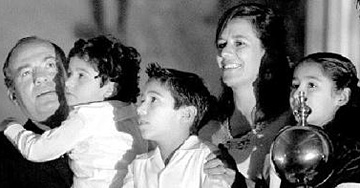 |
 |
 |
 Editorials | Issues | September 2007 Editorials | Issues | September 2007  
Mexicans Embrace Calderon's Reforms
 Catherine Bremer - Reuters Catherine Bremer - Reuters
go to original


| | Mexican President Felipe Calderon, his wife Margarita Zavala and their children watch fireworks explode in the sky above Mexico City's main square Zocaloas last week. Calderon's leadership style has won over many Mexicans who did not vote for him in 2006. (Henry Romero/Reuters) |
Mexico City - With two economic reforms and a crackdown on drugs under his belt, Felipe Calderon is barely recognizable as the man whom a third of Mexicans last year branded a vote thief after a tight presidential election.

Calderon's rise from nondescript energy minister to an adroit and energetic president has won over many who did not vote for him in July 2006, when his narrow election victory bucked a trend toward leftist leaders in Latin America.

A conservative, Calderon scored Mexico's biggest economic reform in a decade last week by convincing normally intractable lawmakers to agree to raise the country's tax take and reduce its reliance on oil sales.

Calderon has sent the army against gangs that smuggle drugs across the U.S. border, winning points with the public even though the cartels remain strong.

"For the grand majority of people ... he's doing a good job," said political analyst Juan Pablo Cordoba at Mexico City's UNAM university.

"If you take into account that he was widely questioned, he arrived in a very close election ... he's certainly achieved success."

Calderon beat leftist Andres Manuel Lopez Obrador by less than a percentage point in 2006. At the time, 37 per cent of Mexicans said they believed the conservative had won the vote only via fraud, a charge later thrown out by a court.

Now, Calderon's approval ratings are above 65 per cent, helped by his tough stance toward drug cartels. Dozens of traffickers have been arrested and major smugglers extradited to the United States, among them the powerful Gulf Cartel's leader, Osiel Cardenas.

Killings in a feud between the Gulf Cartel and the ruthless Joaquin "Shorty" Guzman, a rival drug kingpin, have slowed since a peak in March, thanks partly to the government crackdown.

The short and balding Calderon can't match the charisma of his predecessor Vicente Fox, a mustachioed ex-rancher with the hearty voice and looks of a soap-opera star.

But the pension overhaul and fiscal reform he has passed in nine months in office are more than Fox achieved in six years.

The next reforms on Calderon's list - loosening strict state controls in the energy sector and making the labour market more flexible - will be infinitely more difficult.

"Although there are reasons to be optimistic in the light of these accords, I don't think we should be cracking open the champagne," said Benito Nacif at Mexico's CIDE social science institute.

Calderon's lack of a congressional majority will make it harder to challenge deep-rooted opposition to energy reform.

Still, U.S. investment bank Morgan Stanley called the tax law a "clear step in the right direction" and "a break from Mexico's past of political gridlock." Fitch Ratings upgraded Mexico's long-term foreign currency credit rating.

Although he is a fan of free trade and ideologically close to U.S. President George W. Bush, Calderon has won plaudits in Mexico for harshly criticizing Washington over its failure to soften immigration laws. He has also smoothed relations with Venezuela and Cuba.

A left-wing guerrilla group known by its Spanish initials EPR shook Mexico last week with bomb attacks on oil and gas pipelines, presenting Calderon with an unexpected challenge.

"It's a surprise because the EPR hadn't launched a big operation since 1996," said Alejandro Hope at Mexico's GEA consultancy. "It opens a front we were not expecting." | 
 | |
 |



